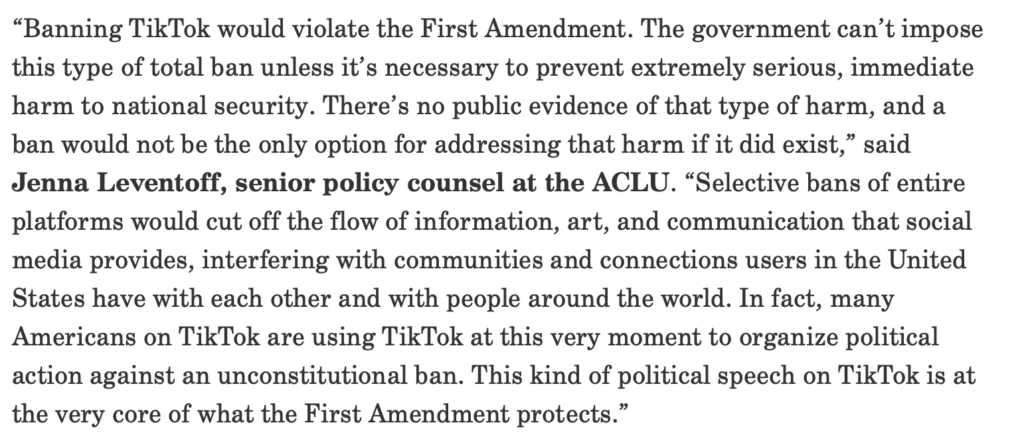Mounting concerns over the company’s Chinese ties put Tik Tok’s CEO in the hot seat on Capitol Hill this week. Shou Chew, Tik Tok’s CEO, sat for almost 5 grueling hours answering questions from lawmakers about the safety of the social media app for American users. Despite his assurances, Congress remains unswayed. Will Tik Tok be banned?
What’s behind the ban?
With over 2/3 of U.S. youth and 150m+ American users on the social media platform, Tik Tok has a massive presence here. Unlike Instagram, Snapchat and Twitter, Tik Tok is the only major social media platform owned by a non-US company. China-based ByteDance is the parent company of Tik Tok. This company is governed by Chinese law, giving it the ability to monitor data across Tik Tok. The worry is that the data could be accessed by the Chinese government for national security intelligence, dissemination of propaganda and other maneuvers. According to CNBC, Chinese law allows that government to “obtain inside information from companies based there for purported national security purposes.”
As we learned from the last Presidential election, social media was a culprit in the dissemination of misinformation. Elon Musk admits that Twitter interfered in the previous election. Having Tik Tok data directly accessible to the Chinese government creates a privacy risk and possible security risk since data can be used to influence Tik Tok’s algorithms and content dissemination. This is the heart of the bi-partisan concerns around Tik Tok.
Shibani discusses the Tik Tok ban and hearing on Fox San Francisco
Alleviating concerns
CEO Shou Chew has taken steps to mitigate security concerns, including storing U.S. data in Oracle servers located outside of China, according to his testimony. Yet, that move isn’t enough to build trust with the Biden Administration nor Congress. Chew admitted in his testimony that global engineers could still access American Tik Tok data, no matter where it was housed, as part of normal business and engineers operations.
Though pundits say he wasn’t successful at it, he did try to assure members of Congress and the American public, that Tik Tok had American concerns on its mind. Some of the “fixes” offered were similar to those offered by big US tech companies in addressing concerns around the impact of social media on teens. There were some differences, too. Here’s is Tik Tok’s commitment:
- We will keep safety, particularly for teenagers, a top priority
- We will firewall protect US data from unwanted foreign access
- Tik Tok will not be manipulated by any government
- Practices will be transparent. Tik Tok will give access to third party, independent auditors to remain accountable
- Tik Tok will remain a place for free expression
First Amendment rights and other factors
Even if Congress and the Biden Administration were to agree on the ban of Tik Tok, there are questions about whether it would be executed. Even though the social media app is banned on government-issued devices, banning it on your device, too, is a big deal. This stretch of allowing the government to get involved in a private business so beloved by millions doesn’t have strong political support in mainstream American audiences. Already, Tik Tok fans and influencers are coming out in support of the app, touting its virtues, and rushing to save it via petition. In addition, the ACLU has come out in opposition of the ban on the basis of First Amendments rights. You can read its statement here.

Yet, an outright ban is possible. The government did something similar when the Committee on Foreign Investment in the United States forced a sale of LGBTQ dating app Grindr from Chinese ownership back in 2019, according to CNN.
What’s ahead
As Congress debates a nation-wide ban, pundits are exploring other options possible to keep American users safe. One option is to aggressively increase the regulation of the app within this country. The idea presented by CEO Chew at this week’s testimony to involve third party auditors is a good start. Another option is to get the Federal Trade Commission involved, as was written about by MSNBC’s Zeeshan Aleem. He writes that the FTC could “play a more aggressive role in creating and enforcing rules around commercial surveillance.”
If an outright ban were to occur, it wouldn’t happen quickly. Even still, Tik Tok fans could still access their favorite social media site, as users do in India, where it is banned. By accessing the app through a VPN, or virtual private network, users can evade the ban and access the app – no matter where they live. Read more about its VPN accessibility here.